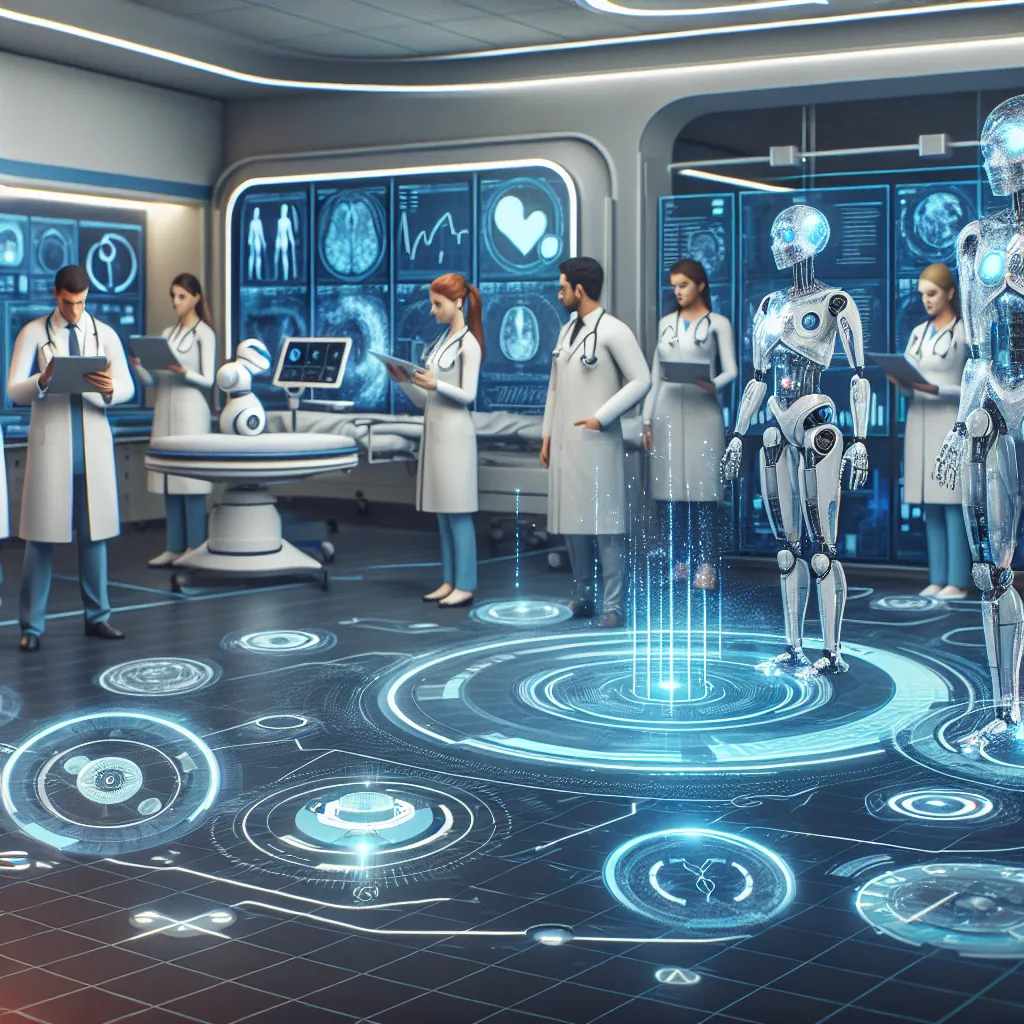Are you preparing for the IELTS Reading test and looking to practice with a relevant and engaging topic? Look no further! This practice test focuses on how artificial intelligence is revolutionizing healthcare, a subject that combines cutting-edge technology with one of the most critical sectors of our society. Let’s dive into this comprehensive IELTS Reading practice test to sharpen your skills and expand your knowledge.
Nội dung bài viết
 AI in Healthcare Innovation
AI in Healthcare Innovation
IELTS Reading Practice Test
Passage 1 – Easy Text
Artificial Intelligence: A Game-Changer in Healthcare
Artificial Intelligence (AI) is rapidly transforming the healthcare industry, ushering in a new era of innovation and efficiency. From diagnosis to treatment planning, AI is proving to be an invaluable tool for healthcare professionals worldwide. One of the most significant applications of AI in healthcare is in medical imaging. Machine learning algorithms can analyze complex medical images, such as X-rays, MRIs, and CT scans, with remarkable accuracy, often surpassing human capabilities in detecting subtle abnormalities.
Another area where AI is making significant strides is in predictive analytics. By analyzing vast amounts of patient data, AI systems can identify patterns and risk factors that may predispose individuals to certain diseases. This allows for early intervention and personalized preventive care, potentially saving countless lives.
AI is also revolutionizing drug discovery and development. Traditional pharmaceutical research is a time-consuming and expensive process, often taking years to bring a new drug to market. AI-powered systems can significantly accelerate this process by simulating molecular interactions and predicting drug efficacy, thus reducing the time and cost associated with drug development.
In addition, AI is enhancing patient care through virtual health assistants and chatbots. These AI-driven tools can provide 24/7 support to patients, answering questions, scheduling appointments, and even monitoring chronic conditions. This not only improves patient engagement but also reduces the burden on healthcare providers.
While the integration of AI in healthcare presents enormous opportunities, it also raises important ethical considerations. Issues such as data privacy, algorithm bias, and the potential for job displacement need to be carefully addressed as we move forward in this AI-driven healthcare revolution.
Questions 1-5
Do the following statements agree with the information given in the reading passage?
Write:
TRUE if the statement agrees with the information
FALSE if the statement contradicts the information
NOT GIVEN if there is no information on this
- AI can analyze medical images more accurately than humans in some cases.
- Predictive analytics powered by AI can help in disease prevention.
- AI has completely replaced traditional pharmaceutical research methods.
- Virtual health assistants can provide round-the-clock support to patients.
- The use of AI in healthcare has no potential drawbacks or ethical concerns.
Questions 6-10
Complete the sentences below.
Choose NO MORE THAN TWO WORDS from the passage for each answer.
- AI is particularly useful in analyzing complex medical images such as X-rays, MRIs, and ___.
- By analyzing patient data, AI can identify ___ and risk factors for certain diseases.
- AI can ___ molecular interactions to speed up drug development.
- AI-powered chatbots can help in monitoring ___ conditions.
- The integration of AI in healthcare raises concerns about data privacy and ___ bias.
Passage 2 – Medium Text
The Convergence of AI and Robotics in Healthcare
The integration of Artificial Intelligence (AI) with robotics is creating a paradigm shift in healthcare delivery. This synergistic relationship between AI and robotics is giving rise to intelligent machines capable of performing complex medical tasks with precision and efficiency. From surgical assistants to rehabilitation robots, these AI-powered machines are revolutionizing patient care and treatment outcomes.
One of the most prominent applications of AI-driven robotics in healthcare is in the field of minimally invasive surgery. Robotic surgical systems, guided by sophisticated AI algorithms, can perform intricate procedures with unparalleled accuracy. These systems can analyze pre-operative imaging data, plan optimal surgical approaches, and even adapt in real-time to unexpected situations during surgery. The result is reduced surgical errors, faster recovery times, and improved patient outcomes.
In the realm of patient care, AI-powered robots are being deployed to assist with various tasks, from dispensing medication to monitoring vital signs. These robots can work tirelessly, reducing the workload on human healthcare providers and minimizing the risk of human error. Moreover, in the context of infectious disease outbreaks, such as the recent COVID-19 pandemic, these robots can be invaluable in providing care while minimizing human-to-human contact.
Rehabilitation is another area where AI-robotics convergence is making significant strides. Exoskeletons and prosthetic limbs controlled by AI are helping patients with mobility impairments regain function and independence. These devices can learn and adapt to individual patient needs, providing personalized therapy and support.
The field of telemedicine has also been greatly enhanced by AI and robotics. Remote-controlled robots equipped with cameras and sensors can allow specialists to examine and even treat patients from a distance. This is particularly beneficial for providing healthcare services in remote or underserved areas.
While the potential benefits of AI-powered robotics in healthcare are immense, there are challenges to overcome. Issues such as high costs, the need for specialized training, and ensuring the reliability and safety of these systems need to be addressed. Additionally, there are ethical considerations regarding the extent to which we should rely on machines for healthcare delivery.
As we move forward, the convergence of AI and robotics in healthcare promises to continue driving innovation, improving patient outcomes, and transforming the healthcare landscape. However, it is crucial to strike a balance between technological advancement and the human touch that is fundamental to healthcare.
Questions 11-15
Choose the correct letter, A, B, C, or D.
-
According to the passage, AI-powered robotic surgical systems:
A) Can only perform basic surgical procedures
B) Are less accurate than human surgeons
C) Can adapt to unexpected situations during surgery
D) Are mainly used for non-invasive procedures -
AI-powered robots in patient care:
A) Can completely replace human healthcare providers
B) Are only useful during pandemic situations
C) Can help reduce the workload on human staff
D) Are primarily used for surgical procedures -
In the field of rehabilitation, AI-powered devices:
A) Are limited to exoskeletons
B) Can adapt to individual patient needs
C) Are not yet practical for widespread use
D) Can only be used in hospital settings -
The integration of AI and robotics in telemedicine:
A) Is only useful in urban areas
B) Allows for remote examination and treatment of patients
C) Has been proven to be more effective than in-person care
D) Is too expensive to implement on a large scale -
The main challenge in implementing AI-powered robotics in healthcare is:
A) Lack of effectiveness compared to traditional methods
B) Resistance from healthcare professionals
C) Addressing issues such as cost, training, and ethical considerations
D) Limited applications in real-world healthcare settings
Questions 16-20
Complete the summary below.
Choose NO MORE THAN TWO WORDS from the passage for each answer.
The convergence of AI and robotics is transforming healthcare in various ways. In surgery, AI-guided robots can perform (16) procedures with high precision. For patient care, robots can assist with tasks like (17) and monitoring patients’ health status. AI-powered (18) are helping patients with mobility issues regain function. In (19) , robots allow specialists to examine patients remotely. Despite the benefits, challenges such as high costs and the need for (20) ___ need to be addressed for widespread adoption.
Passage 3 – Hard Text
The Ethical Implications of AI in Healthcare: Navigating the Future
The rapid integration of Artificial Intelligence (AI) in healthcare has catalyzed unprecedented advancements in medical diagnosis, treatment, and patient care. However, this technological revolution also engenders a plethora of ethical considerations that demand meticulous scrutiny and proactive resolution. As we stand at the cusp of a new era in healthcare, it is imperative to critically examine the ethical implications of AI to ensure that its implementation aligns with fundamental human values and medical ethics.
One of the primary ethical concerns surrounding AI in healthcare pertains to data privacy and security. The efficacy of AI systems is contingent upon access to vast amounts of patient data, raising questions about informed consent and the potential for data breaches. The sensitive nature of medical information necessitates robust safeguards to protect patient confidentiality while simultaneously allowing for the aggregation and analysis of data that drives AI innovation. Striking this delicate balance requires not only technological solutions but also comprehensive legal frameworks and ethical guidelines.
Another significant ethical consideration is the potential for bias in AI algorithms. Machine learning models are only as unbiased as the data they are trained on, and historical healthcare data often reflects societal inequalities and biases. There is a risk that AI systems could perpetuate or even exacerbate existing disparities in healthcare access and outcomes. For instance, if an AI system is trained predominantly on data from one demographic group, it may be less effective in diagnosing or treating individuals from other groups. Addressing this issue requires diverse and representative datasets, rigorous testing for bias, and ongoing monitoring of AI system outputs.
The question of accountability in AI-driven healthcare decisions presents another ethical quandary. As AI systems become increasingly autonomous in areas such as diagnosis and treatment recommendations, it becomes crucial to establish clear lines of responsibility. If an AI system makes an error that leads to patient harm, who is held accountable – the AI developer, the healthcare provider, or the institution implementing the technology? This ambiguity underscores the need for transparent AI systems and clear protocols for human oversight and intervention.
The potential for AI to exacerbate healthcare inequalities is a pressing ethical concern. While AI has the potential to democratize access to healthcare by providing expert-level diagnostics and treatment recommendations in underserved areas, there is also a risk that it could widen the gap between those who have access to AI-enhanced healthcare and those who do not. Ensuring equitable access to AI-driven healthcare innovations is crucial to prevent the creation of a new form of healthcare disparity.
Moreover, the impact of AI on the doctor-patient relationship warrants careful consideration. While AI can augment medical decision-making and improve efficiency, there is a risk of over-reliance on technology at the expense of human judgment and empathy. Maintaining the human element in healthcare is essential, as factors such as emotional support, cultural sensitivity, and intuitive understanding play crucial roles in patient care and cannot be fully replicated by AI.
As we navigate these complex ethical waters, it is crucial to adopt a multidisciplinary approach to AI ethics in healthcare. This should involve collaboration between medical professionals, ethicists, legal experts, AI developers, and patient advocates to develop comprehensive ethical frameworks and guidelines. Continuous education and training for healthcare professionals on the ethical use of AI is also essential.
In conclusion, while AI holds immense promise for revolutionizing healthcare, its ethical implications must be carefully navigated. By proactively addressing issues of privacy, bias, accountability, equity, and the preservation of human-centered care, we can harness the power of AI to improve health outcomes while upholding the fundamental ethical principles that underpin the medical profession. The future of AI in healthcare must be shaped not only by technological capabilities but also by our commitment to ethical, equitable, and patient-centered care.
Questions 21-26
Complete the sentences below.
Choose NO MORE THAN THREE WORDS from the passage for each answer.
- The effectiveness of AI systems in healthcare depends on access to large amounts of ___.
- Historical healthcare data used to train AI models may reflect societal ___ and biases.
- Clear protocols for ___ are needed to address the issue of accountability in AI-driven healthcare decisions.
- There is a risk that AI could create a new form of ___ in healthcare.
- The ___ in healthcare cannot be fully replicated by AI systems.
- A ___ approach involving various experts is crucial for developing ethical frameworks for AI in healthcare.
Questions 27-30
Choose FOUR letters, A-H.
Which FOUR of the following are mentioned in the passage as ethical concerns related to AI in healthcare?
A) Data privacy and security
B) Potential for bias in AI algorithms
C) Increased cost of healthcare
D) Impact on the doctor-patient relationship
E) Reduced need for medical professionals
F) Accountability in AI-driven decisions
G) Slower development of new treatments
H) Exacerbation of healthcare inequalities
Questions 31-35
Do the following statements agree with the claims of the writer in the reading passage?
Write:
YES if the statement agrees with the claims of the writer
NO if the statement contradicts the claims of the writer
NOT GIVEN if it is impossible to say what the writer thinks about this
- AI in healthcare raises more ethical concerns than benefits.
- Bias in AI algorithms can be completely eliminated with current technology.
- AI has the potential to improve healthcare access in underserved areas.
- The use of AI in healthcare will eventually replace the need for human doctors.
- Continuous education on AI ethics is necessary for healthcare professionals.
Answer Keys
Passage 1
- TRUE
- TRUE
- FALSE
- TRUE
- FALSE
- CT scans
- patterns
- simulate
- chronic
- algorithm
Passage 2
- C
- C
- B
- B
- C
- minimally invasive
- dispensing medication
- exoskeletons
- telemedicine
- specialized training
Passage 3
- patient data
- inequalities
- human oversight
- healthcare disparity
- human element
- multidisciplinary
- A, B, D, H
- A, B, F, H
- YES
- NOT GIVEN
- YES
- NO
- YES
- NO
- YES
This IELTS Reading practice test provides a comprehensive exploration of how artificial intelligence is driving innovation in the healthcare sector. By engaging with these passages and questions, you’ll not only improve your reading comprehension skills but also gain valuable insights into this cutting-edge field. Remember to time yourself and practice regularly to enhance your performance in the actual IELTS test.
For more practice on technology-related topics, you might find our articles on the impact of artificial intelligence on global employment and how AI is transforming global healthcare systems helpful. Additionally, to broaden your understanding of technological advancements, check out our piece on how space exploration is driving technological advancements.
Good luck with your IELTS preparation!


